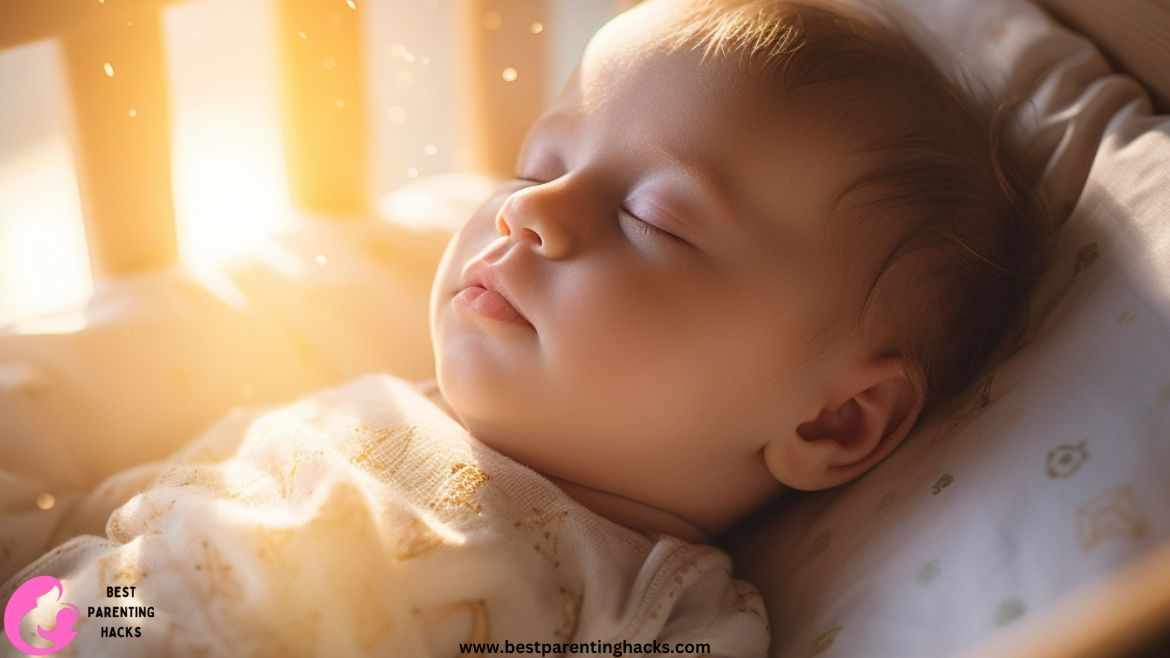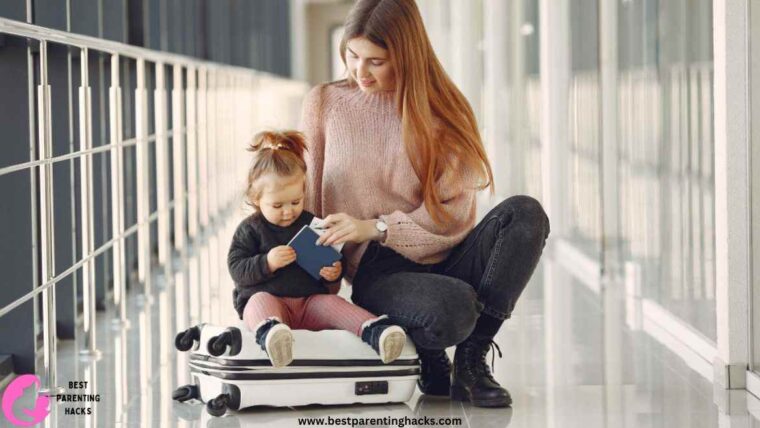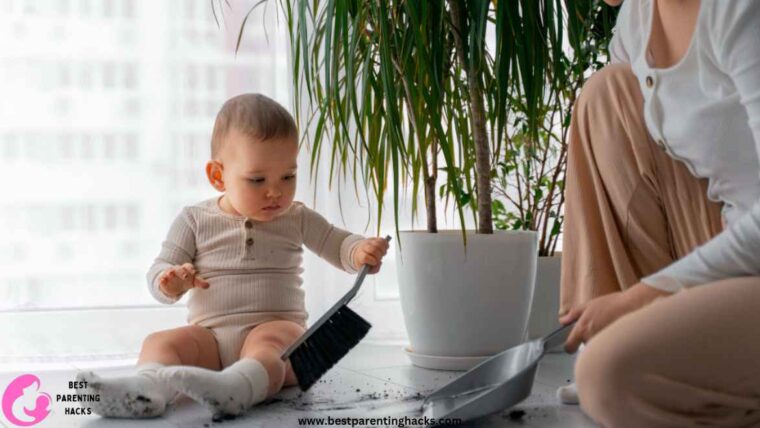Table of Contents
One of the most fascinating—and occasionally worrisome—behaviors my infant has shown me as a parent is sleeping with their head against the crib rails. Parents are frequently perplexed by their infant’s unusual sleeping posture and concerned for the safety and comfort of their little ones. Babies display various sleeping patterns from an early age, some of which may appear strange to us as adults. It might make people laugh or feel concerned to see a newborn putting their head up against the harsh slats of a cot. This behavior raises several issues: Is it an indication of discomfort? Are there any hazards involved? Is it just one of those peculiar behaviors that newborns exhibit?
The simple response to the title question, “Baby Sleeps with Head Against Crib Bars: What Should I Do?” is to ensure the infant is comfortable and safe first. Even though this behavior usually doesn’t indicate a problem, it’s important to know why it occurs and how to react correctly. It is important to watch and ensure the kid stays secure and doesn’t interrupt their sleep, even if they find comfort in this posture. As we explore this subject, we’ll address safety precautions, the causes of this behavior, and when to see a professional, giving worried parents peace of mind and direction.
Understanding Why Babies Sleep This Way
Newborns frequently seek comfort in unconventional ways that adults may find strange. One such habit is sleeping with their head pressed against the crib rails. There are several reasons for this choice. It serves as a first recollection of the cozy uterine environment. Babies are used to tight confines in the womb, so pushing against anything might bring back the feeling of safety and containment. Secondly, this posture might be an attempt at self-soothing. Babies can’t soothe themselves but can be soothed by tactile touch, even with inanimate objects like crib bars.
An additional factor may be the infant’s developmental stage. As babies age, they begin to investigate their surroundings even while asleep and become more conscious of their surroundings. Perhaps some of this exploring will involve pushing against the crib rails. Furthermore, certain newborns may discover this posture eases discomfort, especially during teething when pressure on the head or gums helps.
1. Womb-like Comfort: The cramped area provides a sense of security since it resembles the close quarters of the womb.
2. Self-Soothing: Babies who struggle to self-soothe might find comfort in physical touch, even in cribs with bars.
3. Exploratory Behavior: Babies investigate everything around them as part of their development, and this might include the postures in which they sleep.
4. Relief from Discomfort: The pressure against their head or mouth might help babies who are teething.
You Might Also Like to Read: Is 32 Weeks Too Early to Wash Baby Clothes?

Safety Concerns and Precautions
Seeing a baby sleep with their head resting on the crib rails may be cute, but their safety must come first. These are the top five safety issues and guidelines:
1. Crib Safety Standards: Make sure the crib complies with the most recent safety regulations. The baby’s head shouldn’t become trapped by the bars if they are positioned correctly.
2. Regular Monitoring: Pay careful attention to your infant if they sleep in this posture all the time. You may assist in making sure they haven’t rolled into a dangerous position by checking on them frequently throughout the night.
3. Avoid Loose Bedding: Avoid placing plush animals, cushions, or loose bedding in the crib since these items might raise the risk of SIDS.
4. Positioning and Repositioning: Although it’s acceptable for newborns to sleep in various positions, gently shifting them can help avoid any potential pain or harm if they often rest with their heads against the bars.
5. Room Environment: Preserve a secure atmosphere in the room. To avoid mishaps, the crib should be positioned away from windows, heaters, and wires and the room should have a pleasant temperature.
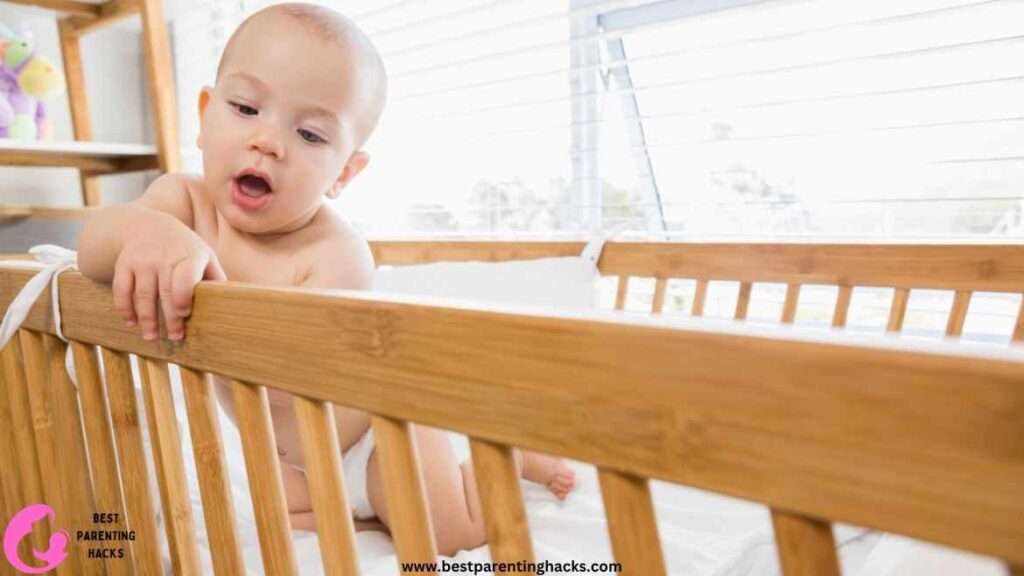
Comfort and Security for Your Baby
Ensuring your baby’s safety and comfort is of importance, during their sleep. This is how you may give them both:
• Creating a Comfortable Sleep Environment: A comfortable mattress and appropriate sleepwear can considerably improve your baby’s sleep quality. Make sure the crib’s mattress is firm and fits snugly, and dress your newborn in attire suited for the ambient temperature.
1. Use of Sleep Sacks: Sleep sacks may give a sense of security without the dangers of unsecured bedding, making them a safe substitute for blankets.
2. Swaddling for Younger Babies: Swaddling an infant can simulate the constriction of the womb, providing protection and comfort.
3. Safe Crib Toys: Comfort can be provided with soft, crib-safe toys that connect to the cot. Make sure they are age-appropriate and firmly fastened on the infant.
4. Pacifiers: If your infant sleeps with a pacifier, it can be a useful tool for self-soothing.
5. Consistent Bedtime Routine: A consistent bedtime routine will reassure your infant and alert them when it is time to sleep.
You Might Also Like to Read: Why Does My Baby Gasp for Air When Excited?

When to Consult a Pediatrician
Knowing when to get expert help is essential for the health of your infant. To help you, consider these four steps:
1. Observation: Keep an eye on your baby’s sleeping habits and actions. You should see a pediatrician if you observe any noticeable changes or pain.
2. Developmental Milestones: Recognize developmental benchmarks. Seek guidance if your baby’s sleeping posture appears to be impacting their development—for example, by generating a flat area on their head.
3. Physical Signs: Keep an eye out for any indications of pain or damage. In case the infant exhibits symptoms of discomfort or harm from sleeping in this posture, consulting a pediatrician is imperative.
4. Parental Instincts: Have faith in your intuition. It’s best to speak with a professional if something about your baby’s sleeping patterns doesn’t feel quite right.
Parental Experiences and Community Advice
Parental groups and forums are gold mines of information and experiences from other parents. Numerous parents have had similar issues and may provide insightful advice. A recurring topic from these conversations is how crucial it is to keep an eye on things and establish a secure sleeping environment. Parents frequently discuss how to gently move their infants and make sure the crib is cozy and secure. Everyone agrees that it’s crucial to have routine pediatric examinations to address any issues with sleep. These groups offer a haven where parents may reassure one another and benefit from one another’s experiences.
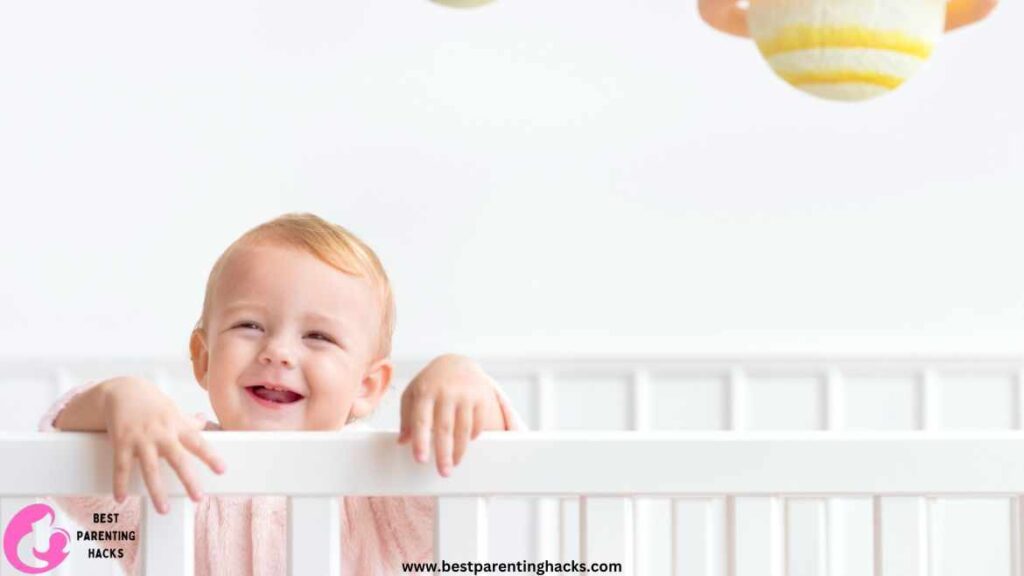
Innovative Solutions and Products
A range of items are available on the market to solve the issue of newborns sleeping with their heads against crib rails. These include specifically made sleepwear that encourages safe sleeping postures and permeable mesh crib liners that keep limbs from becoming caught without endangering asphyxia. Selecting items that meet safety regulations and are suitable for your baby’s age and developmental stage is essential, though. Making educated selections regarding these items may be aided by doing research and reading evaluations.
Conclusion
Parenting presents its own set of special opportunities and challenges. An important aspect of this journey is learning about and adjusting to your baby’s sleeping patterns. Even though it might be unsettling to observe your infant sleeping with their head resting on the crib bars, you can guarantee their safety and comfort by taking the appropriate measures and being aware of the risks. Remember that every infant is different, so what suits one might not suit another. It all comes down to striking the correct balance between making sure your child is secure and enabling them to go to sleep peacefully. As a parent, you should always follow your gut and don’t be afraid to consult a professional when necessary. You can provide your child with a secure and cozy sleeping space if you take your time and are patient with them.
FAQs
1. Is it typical for infants to rest their heads on the crib rails as they sleep? Yes, newborns frequently exhibit this behavior. They frequently use this as a coping strategy or a source of comfort.
2. If my infant sleeps like this, should I move them? Though you can gently move them back into place if they do so and seem secure, you can usually leave them there.
3. Might this kind of sleeping interfere with a child’s development? Generally speaking, no. See a pediatrician, nevertheless, if you see any developmental delays or persistent flat patches on their head.
4. Are there any goods available to assist with this? Safe sleepwear made for babies and breathable mesh crib liners might be helpful. Make sure every product you use complies with safety regulations.
5. How can I guarantee the security of my infant in the crib? Choose a crib that complies with safety regulations, keep your baby’s bedding tight, and check on them frequently—especially if they tend to fall asleep face down.
6. What should I do if my infant feels uneasy in this posture? Try moving them about and see how they react. Speak with a pediatrician for guidance if the discomfort continues.
7. Does this behavior raise the possibility of SIDS? Although the position does not raise the risk of SIDS in and of itself, it is still vital to follow safe sleeping practices, such as putting your infant to sleep on their back and keeping loose blankets out of the way.

